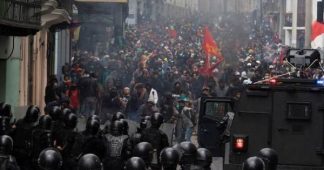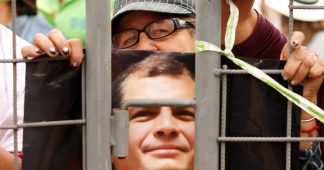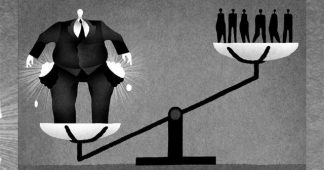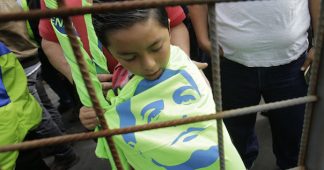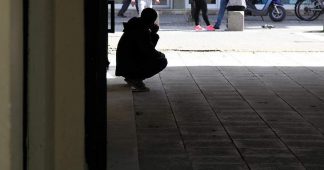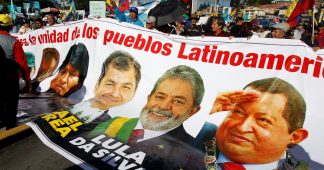By Dr. Birsen Filip
November 10, 2019
On November 7, 2019, the National Court of Justice of Ecuador ratified the preventive detention of former president Rafael Correa, along with a number of his former officials. Immediately after the court rendered its decision for pretrial detention, Correa rejected accusations of bribery, illicit association and contributions to his political campaign between 2012 and 2016, while he was the leader of Alianza Patria Altiva i Soberana (PAIS). Correa founded Alianza PAIS in 2006, as a democratic socialist political party with an objective to achieve economic and political sovereignty, and foment a social and economic revolution in the nation, which came to be known as The Citizens’ Revolution (La Revolución Ciudadana).
During his presidency, which lasted from January 15, 2007 to May 24, 2017, Correa introduced a brand of 21st century socialism to Ecuador, with a focus on improving the living standards of the poorest and most vulnerable segments of the population. His presidency was part of ‘the revolutionary wave’ in Latin America, referred to as ‘Pink tide’, where a number of left-wing and socialist governments swept into power throughout the continent during the 2000s, including Cristina Néstor Kirchner and Fernández de Kirchner in Argentina, Evo Morales in Bolivia, Luiz Inácio Lula da Silva in Brazil, Manuel Zelaya in Honduras, Daniel Ortega in Nicaragua, Fernando Lugo in Paraguay, and Hugo Chávez in Venezuela. All of these governments were opposed to neo-liberal economic policies and American imperialism.
While he was president, Correa raised taxes on the rich and cut down on tax evasion, and increased public investment on infrastructure and public services, including publicly-funded pensions, housing, free health care and education. His government ended up building many schools in different parts of the nation, particularly the countryside, and provided students with nearly all of the materials needed to further their studies. President Correa also more than doubled the minimum wage, which contributed to significantly reducing socioeconomic inequality. In 2018, a World Bank report explained that:
“Ecuador has made notable improvements in reducing poverty over the last decade. Income poverty decreased from 36.7 percent in 2007 to 21.5 percent in 2017. In addition, the share of the population living in extreme poverty fell by more than half, from 16.5 percent in 2007 to 7.9 percent in 2017, representing an average annual drop of 0.9 percentage points. In absolute numbers, these changes represent a total of 1.6 million individuals exiting poverty, and about one million exiting extreme poverty over the last decade”.[i]
Furthermore, the unemployment rate fell from an ‘all time high of 11.86 percent in the first quarter of 2004’ to ‘a record low of 4.54 percent in the fourth quarter of 2014’[ii]. The World Bank also reported that Ecuador posted annual economic growth of ‘4.5 percent during 2001-2014, well above the average for the Latin America and the Caribbean (LAC) region of 3.3 percent. During this period, real GDP doubled and real GDP per capita increased by 50 percent.’[iii]
On October 1, 2016, Correa announced the nomination of Lenín Boltaire Moreno Garcés, who served as his vice president from 2007 to 2013, as his party’s candidate for the 2017 presidential election at the conference of Alianza PAIS. Moreno was elected president, and it was expected that he would continue and build on Correa’s left-wing economic policies. However, within a few months of winning the election, president Moreno began to dismantle many of the social, economic and political reforms enacted by Correa during his decade as president. Contrary to Correa’s government, many of the domestic policies pursued by president Moreno included reducing public spending, weakening worker rights, and providing significant tax cuts to the rich and large corporations. In other words, president Moreno has gradually shifted Ecuador’s left-wing policies to the political centre-right.
Moreno’s presidency also shifted Ecuador’s foreign policy stance, giving it a more neo-liberal and pro-American orientation. When Correa’s socialist government was in power, Ecuador enjoyed close diplomatic and economic relations with Venezuela, and was more independent of American hegemony. For example, president Correa closed a US military base in Manta, Ecuador when Washington’s lease expired in 2009. Prior to that, in 2007, Correa stated:
“We’ll renew the [Manta air] base on one condition: that they let us put a base in Miami — an Ecuadorean base…if there’s no problem having foreign soldiers on a country’s soil, surely, they’ll let us have an Ecuadorean base in the United States”.[iv]
Subsequently, on September 18, 2009, he also said:
“As long as I am president, I will not allow foreign bases in our homeland, I will not allow interference in our affairs, I will not negotiate our sovereignty and I will not accept guardians of our democracy.”
Contrary to Correa, the US-Ecuador military relationship has expanded under the Moreno government ‘through training, assistance, and the reestablishment of an Office of Security Cooperation at the U.S. Embassy in Quito.’[v]Ecuador and the US have also signed deals for the purchase of weapons and other military equipment, and agreed to cooperate more closely in the areas of security, intelligence, and counter-narcotics.
In 2011, president Correa expelled US ambassador Heather Hodges from Quito. Subsequently, in 2014, his government expelled the United States Agency for International Development (USAID) from the country, where it had been operating since 1961 as part of John F. Kennedy’s Alliance for Progress (AFP)[vi]. USAID regularly exercises ‘soft power’ in Latin American nations in order to help the US establish itself as an ‘international police power’[vii]. In May 2019, Moreno’s government announced that USAID would return to Ecuador.
President Correa also became renowned for providing Wikileaks founder Julian Assange with political asylum in Ecuador’s London embassy in 2012 to prevent his arrest and possible extradition to the US. However, shortly after his election, there were indications that Moreno might be willing to hand him over to authorities in the UK. In addition to calling Assange an ‘inherited problem,’ a ‘spoiled brat’ and a ‘miserable hacker’, Moreno accused him of repeatedly violating his asylum conditions and of trying to use the embassy as a ‘centre for spying’[viii]. Then, on April 11, Assange’s political asylum was revoked, which allowed him to be forcibly removed from the Ecuadorian Embassy by British police.In response, Correa called Moreno ‘the greatest traitor in Ecuadorian and Latin American history’ for committing ‘a crime humanity will never forget’[ix].
President Correa’s government supported the integration of South America countries into a single economic and political bloc. However, since Moreno came to power, Ecuador has distanced itself from the Venezuelan government, and withdrew from the Bolivarian Alternative for the Americas[x](ALBA) in August 2018, as well as the Union of South American Nations (UNASUR) in September 2019. UNASUR was established by 12 South American countries in 2008to address important issues in the region without the presence of the United States. Currently, only five members remain: Bolivia, Guyana, Suriname, Uruguay and Venezuela. The other seven members, Argentina, Brazil, Colombia, Chile, Ecuador, Peru and Paraguay, agreed to create the Forum for the Progress of South America (PROSUR) in March 2019. The goal of this alternative organization is to achieve the right-wing agenda in Latin America, as its members support neo-liberal austerity measures and closer ties with Washington. It could be said that PROSUR aligns well with the goals and objectives of the Monroe Doctrine.
Another major shift in president Moreno’s political stance pertains to lawsuits brought against Texaco/Chevron by the Correa government to obtain compensation for environmental damages caused when the operations of Texaco (acquired by Chevron in 2001) dumped 16 billion gallons of toxic wastewater in the Amazon region of Ecuador between 1964 and 1992, affecting more than 30,000 Indigenous people and Campesinos in the area. ‘Chevron left 880 pits full of crude oil which are still there, the rivers are still full of hydrocarbon sediment and polluted by the crude oil spills in Amazonia, which is one of the most biodiversity rich regions in the world’[xi], and ‘the damage has been left unrepaired for more than 40 years’[xii]. To raise public awareness about this environmental disaster, president Correa’s government established an international campaign called the ‘Dirty Hand of Chevron’. In 2011, the Ecuadorian Constitutional Court ordered Chevron to pay $9.5 billion in compensation for social and environmental damages it caused.
In September 2018, the Permanent Court of Arbitration (PCA), an agency of the United Nations based in the Hague, Netherlands, ruled that the Ecuadorian court decision against Chevron was illegal, because it was an outcome of fraud, bribery, and corruption. The PCA ‘also ruled that Ecuador will have to pay economic compensation’[xiii]to Chevron. ‘The amount has not been established yet, but Chevron requested that Ecuador assume the US$9.5 billion’ awarded to affected communities by the Ecuadorean court.[xiv]Following the PCA decision, the government of president Moreno announced that:
the state will sue former President Rafael Correa and his government officials if Ecuador lost the international arbitration process.[xv]
In this matter, president Moreno also accused Correa of ‘failing to defend the country’s interests correctly and spending money on “The Dirty Hand of Chevron” campaign, which according to the government sought to “manipulate national and international public opinion.”’[xvi] In reality, president Moreno supports the PCA decision, thereby prioritizing the interest of Texaco/Chevron over those of his own citizens. In fact, his government has been attempting to nullify the Constitutional Court ruling against Chevron. In response, former president Correa has accused the Moreno government of ‘doing homework ordered by (the United States Vice President Mike) Pence’. Even some of Moreno’s own cabinet ministers condemned the PCA ruling and expressed their support for Ecuador’s Constitutional Court for defending of the country’s nationals interest and the rights of the people of the Amazon.
Correa exhibited a hostile attitude towards the Bretton Woods Institutions during his presidency. He sought to renegotiate Ecuador’s external debt of US$10.2 billion, which he called ‘illegitimate’ because ‘it was accrued during autocratic and corrupt regimes of the past. Correa threatened to default on Ecuador’s foreign debt, and ordered the expulsion of the World Bank’s country manager’[xvii], which was carried out on April 26, 2007. His government also opposed the signing of any agreements that would permit the IMF to monitor Ecuador’s economic plan. As a result of such actions on the part of Correa’s government, ‘Ecuador was able to renegotiate its debt with its creditors and redirect public funds towards social investments.’[xviii]
To the contrary, Moreno has enthusiastically embraced the IMF during his short time as president. On March 1, 2019, Ecuador’s central bank manager, Verónica Artola Jarrín, and economy and finance minister, Richard Martínez Alvarado,submitted a letter of intent to the IMF requesting a three-year $4.2 billion Extended Fund Facility (EFF) agreement. An EFF allows the IMF to assist countries that are facing ‘serious medium-term balance of payments problems.’ More precisely, EFF is designed to:
to provide assistance to countries: (i) experiencing serious payments imbalances because of structural impediments; or (ii) characterized by slow growth and an inherently weak balance of payments position. The EFF provides assistance in support of comprehensive programs that include policies of the scope and character required to correct structural imbalances over an extended period.[xix]
The IMF agreement signed in March allowed Ecuador to borrow $4.2 billion. However, as is always the case, the IMF agreement was not without conditionalities, as it required the Ecuadorian government to implement a series of neo-liberal economic reforms. According to IMF statements, these reforms aim to transform Ecuador’s fiscal deficit into a surplus, reduce the country’s debt-to-GDP ratio, and increase foreign investment. On March 11, 2019, Christine Lagarde, former Managing Director of the IMF, claimed that:
The Ecuadorian authorities are implementing a comprehensive reform program aimed at modernizing the economy and paving the way for strong, sustained, and equitable growth.[xx]
On March 11, 2019, Christine Lagarde also explained that:
Achieving a robust fiscal position is at the core of the authorities’ program, which will be supported by a three-year extended arrangement from the IMF. The aim is to reduce debt-to-GDP ratio through a combination of a wage bill realignment, a careful and gradual optimization of fuel subsidies, a reprioritization of capital and goods and services spending, and a tax reform. The savings generated by these measures will allow for an increase in social assistance spending over the course of the program. The authorities will continue their efforts to strengthen the medium-term fiscal policy framework, and more rigorous fiscal controls and better public financial management will help to enhance the effectiveness of fiscal policy.[xxi]
Protecting the poor and most vulnerable segments in society is a key objective of the authorities’ program. In this context, the authorities plan to extend the coverage of, and increase the nominal level of benefits under the existing social protection programs. Work is also underway to improve the targeting of social programs.[xxii]
Ecuador’s participation in the Organization of the Petroleum Exporting Countries (OPEC) represents another point of contention between Correa and the Moreno government. Ecuador was a member of OPEC from 1973 and 1992. After a period of absence, it rejoined the organization in 2007 after Correa became president of the country. However, on October 1st, president Moreno announced that Ecuador would once again end its membership in OPEC effective January 1, 2020. Given Moreno’s penchant for implementing neo-liberal economic policies, this decision was likely based on the notion that freeing the country from the burden of having to abide by quotas would bring fiscal sustainability to Ecuador. This is evidenced by the fact that Ecuador contacted OPEC to request permission to produce above its quota in February 2019, though it was never confirmed whether a response was received[xxiii]. While increasing production in its Amazonian oil fields would likely bring more foreign investment to Ecuador and open up new markets, it would also lead to serious conflicts between the Moreno government and the indigenous people living in the area, who are strongly opposed to oil extraction.
In addition to announcing Ecuador’s departure from OPEC, president Moreno also selected October 1stas the date to introduce Decree 883, a series of economic measures that included ending longstanding subsidies for fuel, the removal of some import tariffs, and cuts to the benefits and wages of public employees. In particular, the elimination of fuel subsidies, which had been in place for 40 years, was instituted in order to meet IMF requirements to keep the $4.2 billion programme on track, and to satisfy international investors. The EFF agreement between the IMF and the Ecuadorean government also called for thousands of public employees to be laid off, the privatization of public assets, the separation of the central bank from the government, cutting public expenditures, and raising taxes over the next three years. IMF representatives claim that these types of reforms bring more foreign direct investment into the economy.
In fact, a close examination of the neo-liberal economic reforms recommended by the IMF in many countries reveals that they are almost identical, meaning that they do not take the diverse needs and realities of each country into account; rather, they are driven by the interests of the countries and other stakeholders that provide the funds. Generally, the IMF’s recommendations[xxiv]consist of cutting deficits, liberalizing trade, privatizing state-owned enterprises, reforming the banking and financial systems, increasing taxes, raising interest rates, and reforming key sectors. However, countless studies have revealed that these types of reforms, have raised the unemployment rate, created poverty, and have often preceded recessions. On October 2, 2019, the IMF issued a press release on Ecuador stating that:
The reforms announced yesterday by President Lenin Moreno aim to improve the resilience and sustainability of Ecuador’s economy and foster strong, and inclusive growth. The announcement included important measures to protect the poor and most vulnerable, as well as to generate jobs in a more competitive economy.
The authorities are also working on important reforms aimed at supporting Ecuador’s dollarization, including the reform of the central bank and the organic code of budget and planning.
IMF staff will continue to work closely with the authorities to improve the prospects for all Ecuadorians. The second review is expected to be submitted to the Executive Board in the coming weeks.[xxv]
President Moreno’s decision to end the subsidies on fuel led to the prices of diesel and petroleum increasing by 100% and 30%, respectively, overnight, which directly contributed to significantly raising the costs of public transportation. In response, protests erupted against Moreno’s austerity measures on October 3rd, featuring students, unions and indigenous organizations. They declared an indefinite general strike until the government reversed its neo-liberal adjustment package. Moreno’s initial response was to reject the ultimatum and state that he would ‘not negotiate with criminals.’
The following day, on October 4, 2019, president Moreno declared a state of emergency under the pretext of ensuring the security of citizens and to ‘avoid chaos.’ Nonetheless, the protests continued and intensified to the point that the government was forced to relocate to city of Guayaquil because Quito had been overrun by anti-government protestors. However, this attempt to escape the protestors proved ineffective as taxi, bus and truck drivers blocked roads and bridges in Guayaquil, as well as in Quito, which disrupted transportation nationwide.
In the following days, thousands of demonstrators continued to demand the reversal of austerity measures, as well as the resignation of the president. However, Moreno remained defiant, refusing both demands under all circumstances. Subsequently, Ecuador’s main oil pipeline ceased operations after it was seized by indigenous protesters. Petro-Ecuador was concerned that production losses could reach 165,000 barrels a day. Indigenous protesters also occupied two water treatment plants in the city of Ambato. Meanwhile, violent clashes between protesters and police resulted in seven deaths, about 2,000 injuries, and over 1,000 arrests. Eventually, Moreno’s government was forced to back down and make concession with the well-organised protesters.
On October 13, president Moreno agreed to withdraw Decree 883 and replace the IMF-backed plan with a new proposal, involving negotiations with the Confederation of Indigenous Nationalities of Ecuador (CONAIE) and other social groups. The following day, president Moreno signed Decree 894, which reinstated the cancelled fuel subsidies. However, on October 23, CONAIE released a statement informing the public that ‘it paused talks with President Lenin Moreno because of the government’s “persecution” of the group’s leaders [Jaime Vargas] since a halt to violent anti-austerity protests.’[xxvi]
It is unlikely that president Moreno would be willing to give up on his austerity policies or start the process of cancelling the IMF loan, given his apparent commitment to helping the US realize the spirit of the Monroe Doctrine. Many of the reforms and policies that his government has introduced will help keep Ecuador firmly entrenched in America’s backyard for years to come.
This is not a new development, as history has revealed that, for more than a century, ‘in Latin America there are more than enough of the kind of rulers who are ready to use Yankee troops against their own people when they find themselves in crisis’ (Fidel Castro, Havana 1962). However, the eruption of protests in response to Moreno’s neo-liberal reforms suggests that he faces an uphill battle, as his fellow Ecuadorians do not appear to share his enthusiasm for selling his country to external creditors and foreign influences. Although Moreno has managed to successfully drive Rafael Correa out of Ecuador, the former president’s opposition to capitalism and imperialism remain strong among the population.
*
Global Research contributor Dr. Birsen Filip holds a Ph.D. in philosophy from the University of Ottawa.
Notes
[ii] https://tradingeconomics.com/ecuador/unemployment-rate
[iv] https://uk.reuters.com/article/ecuador-base/ecuador-wants-military-base-in-miami-idUKADD25267520071022
[v] https://www.state.gov/u-s-relations-with-ecuador/
[vi] ‘AFP was a 10-year, multibillion-dollar aid program targeting Latin American countries, whereas USAID sought to support economic growth and progress in the agriculture and health care services sectors, while also promoting democratic institutions and democratic forms of governance. The impetus for the establishment of the AFP and its involvement in Latin American countries, in conjunction with USAID, was the success of the Cuban Revolution in 1959, which culminated in the overthrow of the oppressive regime led by Fulgencio Batista, who ruled the country as a dictator with full US backing. This led to the Americans losing their considerable influence over the island. More importantly, this outcome made the US leadership paranoid that other countries situated in their “backyard” might follow Cuba’s example and revolt against US-supported dictators and regimes, nationalize businesses and resources, and establish closer ties with the Soviet Union. Washington used the AFP and USAID as mechanisms by which to improve trade ties with Latin American countries with the ultimate objective of preventing the spread of communism in the region.’ https://www.globalresearch.ca/the-flower-industrys-impacts-on-colombia-on-mothers-day/5640156
[vii] https://www.globalresearch.ca/the-flower-industrys-impacts-on-colombia-on-mothers-day/5640156
[viii] https://www.theguardian.com/media/2019/apr/14/assange-tried-to-use-embassy-as-centre-for-spying-says-ecuadors-moreno
[ix] https://www.rt.com/news/456229-correa-slams-moreno-assange-arrest/
[x] To counter the influence that the US exercised over Latin American economies, Chávez proposed the creation of an alternative economic agreement that was anti-imperialist in nature. In 2004, the Bolivarian Alternative for the Americas (ALBA) was established, initially funded by Cuba and Venezuela.
[xi] https://www.stopcorporateimpunity.org/21st-may-the-global-antichevron-day-of-action-is-coming/
[xii] https://www.stopcorporateimpunity.org/21st-may-the-global-antichevron-day-of-action-is-coming/
[xiii] https://www.telesurenglish.net/news/Arbitration-Tribunal-Rules-Against-Ecuador-Favors-Chevron-20180907-0011.html
[xiv] https://www.telesurenglish.net/news/Arbitration-Tribunal-Rules-Against-Ecuador-Favors-Chevron-20180907-0011.html
[xv] https://www.telesurenglish.net/news/Arbitration-Tribunal-Rules-Against-Ecuador-Favors-Chevron-20180907-0011.html
[xvi] https://www.telesurenglish.net/news/Arbitration-Tribunal-Rules-Against-Ecuador-Favors-Chevron-20180907-0011.html
[xvii] https://www.telesurenglish.net/analysis/Ecuadors-Citizens-Revolution-A-Shift-in-Foreign-Policy-20150107-0029.html
[xviii] https://www.telesurenglish.net/analysis/Ecuadors-Citizens-Revolution-A-Shift-in-Foreign-Policy-20150107-0029.html
[xix] https://www.imf.org/en/About/Factsheets/Sheets/2016/08/01/20/56/Extended-Fund-Facility
[xx] https://www.imf.org/en/News/Articles/2019/03/11/ecuador-pr1972-imf-executive-board-approves-eff-for-ecuador
[xxi] https://www.imf.org/en/News/Articles/2019/03/11/ecuador-pr1972-imf-executive-board-approves-eff-for-ecuador
[xxii] https://www.imf.org/en/News/Articles/2019/03/11/ecuador-pr1972-imf-executive-board-approves-eff-for-ecuador
[xxiv] The IMF’s original mandate was to promote international monetary cooperation, facilitate the development of international trade, and support the stability of exchange rates in order to restore economies, prevent recessions, and create full employment and economic growth. However, the IMF’s mandate has been noticeably transformed over time. In particular, many of the activities of the IMF during the Cold War Era designed to counteract the spread of socialist regimes. For example, the IMF was willing to provide financial assistance to underdeveloped countries as long as they implemented policies that secured the conditions of free-market economics. During the 1980s, the IMF began forcing its highly-indebted members to adopt Structural Adjustment Programs (SAPs) that detailed the neo-liberal economic reforms that would have to be implemented as conditions for receiving loans.
Loans provided by the Bretton Woods Institutions have been contingent upon recipient countries adopting major neo-liberal economic reforms aimed at restructuring their economies in a manner that prioritized making loan repayment at a specified time. The implementation of SAPs is required for a developing nation to be eligible to receive financial assistance from not only the IMF, but also from a number of other donor sources. In other words, a loan will only be approved if a government adopts the IMF recommendations laid out in its SAPs and respects the deadlines for their implementation. Furthermore, after the loan agreement has been approved, the IMF reserves the right to interrupt the disbursements at any time if the government does not respect the precise deadlines for implementing the specified reforms.
[xxv] https://www.imf.org/en/News/Articles/2019/10/02/pr19362-ecuador-imf-statement-on-ecuador
Featured image is from The Grayzone
Published at https://www.globalresearch.ca/ecuador-the-restoration-of-neoliberalism-and-the-monroe-doctrine/5694440
